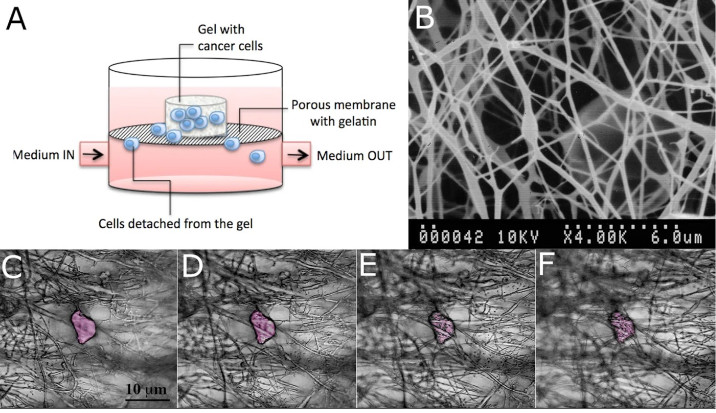The team describes a 3D breast tumor model cultured within the multi in vitro organ device
Breast cancer is the most common cancer in women and one of the leading causes of cancer related deaths worldwide. Mortality is mainly associated with the development of metastases, the spread of a tumor from its primary site to other parts of the body. Thus, a deeper understanding of the pathways that give rise to metastasis is one of the key challenges for developing new therapies to fight breast cancer. Metastasis is a complex and multistep process: in order to generate secondary tumors, cells must detach from their primary site, enter within the systemic circulation, establish contacts with the endothelium, adhere to the vascular walls and finally transmigrate across the endothelial layers as single cells or clusters. In a research study published in Scientific Reports authors developed a 3D breast cancer model. Composite gels constituted by different concentrations of Alginate and Matrigel were developed to obtain a structurally stable-in-time and biologically active substrate. Human aggressive breast cancer cells (i.e. MDA-MB-231) were cultured within the gels. Known the link between cell morphology and malignancy, cells were morphologically characterized and their invasiveness correlated through an innovative bioreactor-based invasion assay. A particular type of gel (i.e. 50% Alginate, 50% Matrigel) emerged thanks to a series of significant results: 1. cells exhibited peculiar cytoskeleton shapes and nuclear fragmentation characteristic of their malignancy; 2. cells expressed the formation of the so-called invadopodia, actin-based protrusion of the plasma membrane through which cells anchor to the extracellular matrix; 3. cells were able to migrate through the gels and attach to an engineered membrane mimicking the vascular walls hosted within the MIVO bioreactor, providing a completely new 3D in vitro model of the very precursor steps of metastasis.
M. Cavo, M. Caria, I. Pulsoni, F. Beltrame, M. Fato, S. Scaglione (2018): “A new cell-laden 3D Alginate-Matrigel hydrogel resembles human breast cancer cell malignant morphology, spread and invasion capability observed “in vivo”. Sci Rep.
All Resources
Never stop learning!
Check publications from the team, protocols, and useful information to boost your research and get into organ on chip technology!


